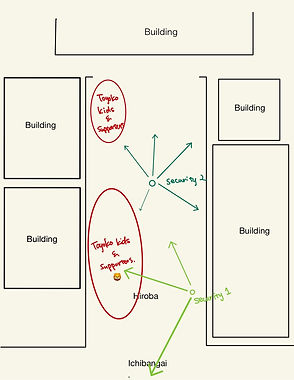
Security Guards
Masculinity
by Amelie
If you see any of the security guards in Kabukicho, you would be amazed by how tall and buff they all are. Their physique screams masculinity, and in fact, in the field no female security guards were spotted.
The private security industry - dominated by males - coupled with the expansion of the night-time economy, raises important issues pertaining to the use of coercive violence by security guards and the construction of masculinities in licensed entertainment venues. (Tomkins, 2005)
This shows that having masculine men on the task is a natural thing for private security companies. So, what does masculinity mean?
According to Kimmel, “Masculinity” refers to the behaviors, social roles, and relations of men within a given society as well as the meanings attributed to them (Kimmel, 2011). The term masculinity stresses gender, unlike male, which stresses biological sex.”, which means that masculinity is rather a concept than a mere label. Washington Post describes manliness as the following; the stereotype goes something like this: a “real man” is stoic and unemotional. A “real man” is physically strong, a protector, A “real man” doesn’t show weakness, ask for help or show vulnerability.
These characteristics above also fits what the security guards in Kabukicho have. For example, as you can see from the photo on the right, the security guards in Kabukicho are buff and seem to have more muscle than a random man out there. They also usually have wider shoulders and are taller than most people in the area, which are signs of being physically strong as “a protector”. Furthermore, the special use of security guards are quite different from others in the sight as well. To illustrate, in Toyoko Hiroba where they stand for a long period of time, they would stand in the middle or a little on the side of the Hiroba. While standing, almost no one would go near them, except for drunk Toyoko kids and people who are lost. This study of space is called proxemics, and the security guards reflects that a study by Madden can be applied in modern days as well.

While the results of this study are mixed, they do provide insights that dispel the notion of the dominant male spatial status and female vulnerability (invasion). This study began with the assertion (i.e., Knapp & Hall 1992) that persons of high status (males) have more and better space for their use than do persons of lower status (females), and consequently that persons of high status are "invaded" less frequently when interacting with persons of lower status. (Madden, 1999)

A map on how the security people and Toyoko kids use up their space. Although the Toyoko kids would barely invade the security’s space, the security can invade their space. Especially the one that is standing closer to TOHO cinema.
In this study, men were less likely invaded their space by others, while the female was invaded a lot. The study concluded as the above, that the proxemics and the invasion of space shows power hierarchy within men and women. Even in Kabukicho, The security people, who might be the most masculine figures in the area, are less likely to be invaded their space by others, while pedestrians, although men are often asked as well, women, are invaded their space easily by catch and scouts. Moreover, when the security guards are standing, the pedestrians, Toyoko kids, Toyoko supporters, normally stay away from them, which shows that the proxemics seemingly is affected not only by gender but occupancy as well. This could be shown by the fact that the pedestrians sit or lean on the bars near the entrance of the hiroba, where it is pretty close to the space that the Toyoko kids would occupy, but far from where the security would stand. In addition to that, many security guards in this area are non-Japanese or biracial, as it can be observed by the photo above, which could also be a cause of this since many Japanese tend to avoid people from other races.
Masculinity, in this area, could be say is a means for the security guards to appear superior to the other people in Kabukicho. It helps them to pursue their role as a protector, and reduces unwanted communication with others, which could also suggest that having masculinity would add up to their authority as a private security guard in the neighborhood. It provides them with unapproachableness towards the crowd.
Sections
Security guards
